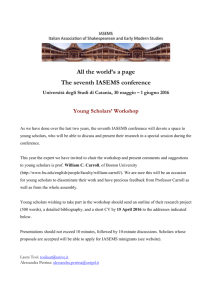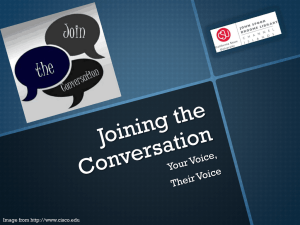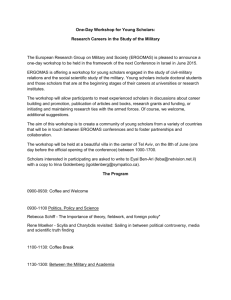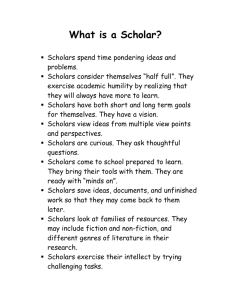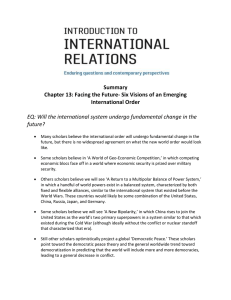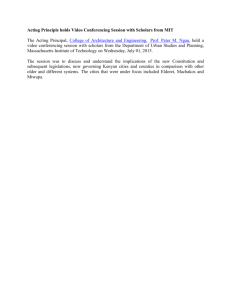Sophomore Scholars Experience Nicaragua
advertisement
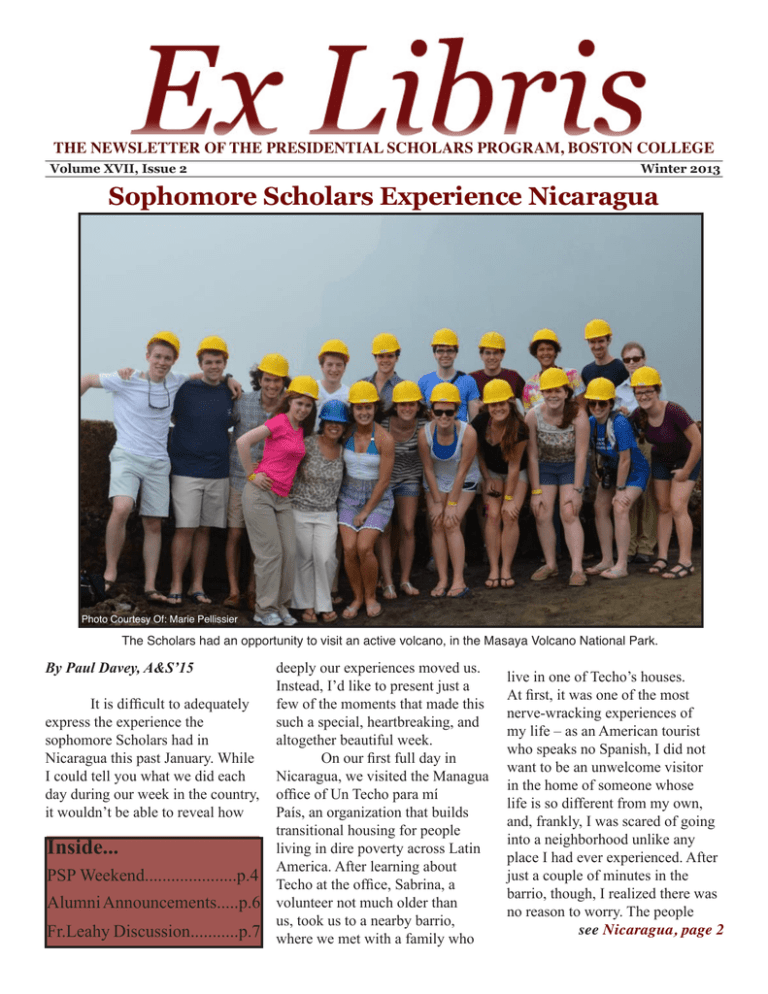
THE NEWSLETTER OF THE PRESIDENTIAL SCHOLARS PROGRAM, BOSTON COLLEGE Winter 2013 Volume XVII, Issue 2 Sophomore Scholars Experience Nicaragua Photo Courtesy Of: Marie Pellissier Photo:Andrea Gatti The Scholars had an opportunity to visit an active volcano, in the Masaya Volcano National Park. By Paul Davey, A&S’15 It is difficult to adequately express the experience the sophomore Scholars had in Nicaragua this past January. While I could tell you what we did each day during our week in the country, it wouldn’t be able to reveal how Inside... PSP Weekend.....................p.4 Alumni Announcements.....p.6 Fr.Leahy Discussion...........p.7 deeply our experiences moved us. Instead, I’d like to present just a few of the moments that made this such a special, heartbreaking, and altogether beautiful week. On our first full day in Nicaragua, we visited the Managua office of Un Techo para mí País, an organization that builds transitional housing for people living in dire poverty across Latin America. After learning about Techo at the office, Sabrina, a volunteer not much older than us, took us to a nearby barrio, where we met with a family who live in one of Techo’s houses. At first, it was one of the most nerve-wracking experiences of my life – as an American tourist who speaks no Spanish, I did not want to be an unwelcome visitor in the home of someone whose life is so different from my own, and, frankly, I was scared of going into a neighborhood unlike any place I had ever experienced. After just a couple of minutes in the barrio, though, I realized there was no reason to worry. The people see Nicaragua, page 2 Nicaragua con’t from page 1 that we talked to were incredibly welcoming, and their gratitude for what they had in life was nothing short of astonishing. Despite living with several children in a plywood house no larger than my dorm, the mother of the household showed immense appreciation towards Techo for providing her family with the opportunity to own this home. Equally touching was seeing the connection made between the children of the barrio and our group, especially Fr. Andrea Vicini, who accompanied our class to Nicaragua. The kindness of these children, who freely accepted a group of visitors from another culture, was truly touching. As the smiling children chased our bus down the dirt road out of the barrio, I think we all sensed that it was an experience we would never forget. Later in the week, we had the chance to visit Nica HOPE, Photo: Marie Pellissier Daniel Cattolica, A&S’15, talks with Fr. Fernando Cardinal in Managua. a charity that operates near the Managua city dump. Several thousand people, many of them children, work all day in toxic conditions at the dump for very little money. Nica HOPE provides supplies and support for children in the community to help them attend school instead of working in the dump, and offers computer and vocational training to help them Photo: Paul Davey Stephen Buell, CSOM’15, expresses the group’s gratitude to the speaker at the Free Trade Zone. 2 attain jobs outside of the dump. After learning about the work that the charity does, we had the chance to make bracelets with young women from the community who have learned through the program how to make jewelry and become independent artisans. The chance to work together, even in such a small way, with people our own age let us have a peek into the lives of people just like us who happened to be born in another part of the world. It was upsetting to think that these girls had it better than most in their community, but seeing firsthand the positive impact that projects like this can have was inspiring. On our last day in Nicaragua, we had the chance to relax at Lake Apoyo, a beautiful volcanic lagoon in the wilderness outside of Managua. We sat down to lunch at picnic tables near the lake, and soon a group of young children, dirty and lacking proper clothing, was looking on enviously from an area nearby. We gave them some of our pizza and tried to be friendly to them, but we also knew that there wasn’t any way to have a lasting positive impact in their lives. This moment served as a poignant reminder as we were preparing to head back to Boston – while we could simply return to our comfortable lives, relax, and forget about our time in Nicaragua, the people that we encountered will continue to live lives on the bottom rungs of a ladder to which we, who hold the power at the top, assent when we don’t work against it. As Fr. Fernando Cardenal, a Nicaraguan Jesuit and former Minister of Education, told us so eloquently earlier that day, we must be sure not to come to the end of our lives with “empty hands” – while we still have the chance, we must be active in improving the conditions of those less fortunate than us. Our encounter with these children reminded us that there will always be injustice in the world; whether we choose to relax and ignore it or fight against it is up to us. Scholars listen to Sabrina and another youth volunteer at Un Techo Para Mi Pais. Photo: Paul Davey Photo Courtesy Of: Marie Pellissier The Scholars and Fr. Vicini pause for a group photo at the Managua overlook. These moments make up just a small sample from a trip that included visiting women’s centers helping females in a machismo culture, talking to people who face the abusive maquilas that make the cheap clothes we buy, meeting young political activists fighting against a corrupt and undemocratic government, seeing firsthand an overcrowded hospital, where patients were crowded in unsanitary hallways, and many other unforgettable experiences. Any sophomore could talk for hours about the incredible people and the tragic situations we encountered in Nicaragua. We encountered injustice on a massive scale, but we also met people who have dedicated themselves to fighting it. This, above all else, was the key lesson of the trip; it’s fashionable to say that one person can make a difference, but we saw it happening firsthand. Whether it 3 was Sabrina, the university student who builds houses for people living in unimaginable squalor; Silvia, the nurse who helps run an affordable women’s health center in one of the poorest parts of Managua; Suyen, our incredibly kind guide in the country who spends her free time working for a political party dedicated to improving the lives of all Nicaraguans; or Fr. Cardenal, a priest whose dedication to social justice found him creating and leading one of the largest and most successful literacy campaigns in world history; the people that we met have changed lives. The inspiration of their examples, I hope, will stay with us as the months and years wear on, and each of us will someday look back on our week in Nicaragua as a key moment in lives led to help in the fight for justice, in our own communities and around the world. PSP Hosts Fifty-Eight Prospective Scholars By Lucy Methven, LSOE’16 Walking past the glass doors of the Undergraduate Admission office on Wednesday, January 30, an onlooker may have been surprised to learn that not one of the students filling the crowded room was inquiring about applying to Boston College. All had already been accepted. Fifty-eight prospective students, more affectionately known as “prospies,” who had just arrived for the annual PSP Weekend mingled with the group of current Scholars. After travelling from twenty-three different states, one foreign country, and one U.S. territory, the visitors enjoyed a casual pizza dinner and had a chance to get to know their hosts before officially beginning the eventful weekend. The students were first invited to a reception at Lawrence House, where they were presented with an assortment of delicious desserts and the opportunity to meet their fellow visitors. The main activity for the night, an interactive take on the traditional Bingo game, had the prospies quizzing each other Photo: Andrea Gatti Marisa Sullivan speaks at the welcome dinner. Photo: Andrea Gatti Marisa Sullivan talks with prospective Scholars after the dinner. to learn who in the group had been skydiving, who has a twin, and who knew how to salsa. Even among this group of highly accomplished students with diverse backgrounds and experiences, it was difficult to find someone who had churned butter! As Fr. Keenan explained in his greeting to the parents, the weekend is designed both to allow the program directors and current Scholars the chance to get to know the prospective Scholars as well as give the students as extensive an overview as possible of life in Boston, at BC, and as a Presidential Scholar. Over the next two days, the visitors each participated in two interviews, one with a faculty member and one with an admissions counselor. Additionally, the CSOM students engaged in a debate while the rest of their peers participated in mock honors seminars. They were given a true taste of life as a BC student as they snacked on Late Night mozzarella sticks and carefully read Shakespeare’s The 4 Merchant of Venice or selected articles in preparation for their discussions and debates. In order for the guests to gain a better understanding of the PSP, Fr. Keenan delivered an overview of all of the main elements on Thursday morning. A panel of upperclassmen and faculty mentors also gave a presentation, which discussed the research aspect of the program. During the PSP Weekend Welcome Dinner on Thursday evening, students were able to speak with current Scholars, faculty, and alumni involved with the program. Marisa Cochrane Sullivan ’07 was the featured speaker at the event. She spoke of the many impressive accomplishments and varied experiences of both herself and her classmates. She explained that the best advice she could offer was to “be playful.” She encouraged her captive audience to be willing to try new things. At Saturday’s “Off-theRecord” Dinner, current Scholars echoed this advice as they detailed their diverse personal experiences with the program. The visiting students were given a chance to have all of their questions answered in the more casual setting of the Corcoran Commons dining hall. The guests also had many opportunities to experience small tastes of life on the BC campus. Attendance at both Friday’s Undergraduate Research Symposium and Saturday’s Honors Day Program offered introductions to the academic side of the program. Additionally, free time allowed many prospies to tour the campus, attend classes with their hosts, and even visit with professors. On Friday evening, program staff and a number of current Scholars accompanied the prospective students as they experienced what a privilege it is to be on a campus located so close to downtown Boston. The group enjoyed dinner at the Hard Rock Café and then attended a performance of Sister Act at the Boston Opera House. It was a fun night for all! As the weekend wound down, Saturday’s Trivia Night provided fun competition among Photo: Andrea Gatti Team “Prospie Power” wins trivia night! both current and prospective Scholars. Everyone enjoyed ice cream sundaes as they struggled to remember a myriad of facts, including the name of Beyoncé’s daughter and the capital of Vermont. Appropriately enough, Team “Prospie Power” prevailed at this year’s game. A celebration of Mass and a delicious brunch in the Heights Room ended the festivties on Sunday morning. A number of parents joined their sons and daughters to meet those currently involved in the PSP and learn a bit about it. As Marisa Cochrane Sullivan explained on Thursday evening, the Presidential Scholars Program is “so much more than free tuition.” This weekend demonstrated to the fifty-eight visitors just how much the PSP has to offer and where they can potentially fit into this great community. Congratulations to Presidential Scholars David DePalma, A&S’14 Tori Luu, A&S’14 & Lucas Allen, A&S’16 who traveled to Washington DC with the Boston College Marching Band in January to perform in the Presidential Inauguaration Parade! Photo Courtesy Of: David Healy 5 Scholars Enjoy American History with a Side of Angst By Marie Pellissier, A&S’15 In November, the sophomore Scholars had the opportunity to see “Bloody Bloody Andrew Jackson” at the SpeakEasy Stage Company. The show does a good job of educating the audience about the life and times of Andrew Jackson while infusing the proceedings with a heaping dose of angst. Anachronistic costumes, puns, and music helped keep the audience engaged in the story of Andrew Jackson, portrayed as an upset young man with a troubled childhood. After his parents are murdered by Native Americans, young Andrew becomes permanently jaded, convinced that the only way to preserve the frontier life he loves is to get rid of the European foreigners and the Native Americans whom he believes are encroaching on American settlement. Jackson meets Rachel, the love of his life, and she fantasizes about the life they could have if Jackson weren’t a rising political rock star. The Founding Fathers John Quincy Adams, Henry Clay, Martin VanBuren, and John Calhoun explain the corrupt bargain that kept Jackson from the presidency in 1824, and in 1828, he is elected President. Jackson consolidates executive power, as the “People’s President,” and when Rachel dies, realizes that he may not have set the best priorities. The overall consensus in the sophomore class was that this was one of the funniest musicals we had seen with the PSP. Cara Harrington, A&S 15, really enjoyed the avant-garde nature of the show. “It was very colorful… edgy and political and captured my attention from start to finish,” she said. It garnered positive reviews from many of the other Scholars as well. The irony and the humorous take on one of the most interesting parts of American political history made Bloody Bloody Andrew Jackson both entertaining and a learning experience. Alumni Announcements Brian Soucek, PSP ’98, has taken a job as an Assistant Professor at the UC Davis School of Law. He and his partner, Matt, will be moving to San Francisco this summer and he will begin teaching in the fall. Gary Gabor, PSP ’02, started this past fall as an Assistant Professor of Philosophy at Hamline University in St. Paul, MN. Jonathan Pike, PSP ’10, has changed jobs and is now the Director at FTI Consulting in Boston. 6 Andrew Steck, PSP ’10, is engaged to Jamie Tiscia, LSOE ’10. They will be married in 2014. Joseph Zabinksi, PSP ’10, just finished his Masters of Engineering Management (MEM) degree at Dartmouth and is now a Strategic Operations Analyst at Babcock Power in Danvers, MA. Abby Letak, PSP ’12, had a modified version of her Sociology Honors Program/ Scholar of the College thesis “Accidental Intellectuals: LOST Fandom and Philosophy” published as one of the essays in “LOST Thought: University Edition.” Scholars Address Campus Issues with the President By Nathan Schwan A&S’16 For the second consecutive year, Presidential Scholars met with the President of Boston College, Father William P. Leahy, S.J., to discuss salient student issues ranging from the Core Curriculum and diversity initiatives to the residential dining plans and drinking policy. We met Fr. Leahy—the first time for many of the freshman Scholars—in a formal but relaxed setting where the conversation was open to any Scholar who wished to voice an opinion. First, he addressed us as a group, and then listened attentively to our brief individual introductions, commenting that he would like to know us better because we hold so many positions of leadership around campus. Following the personal statements from over fifty Scholars, Fr. Keenan took the responsibility of moderating the talk due to the wide variety of topics submitted to be addressed. However, as the agenda gained some momentum, the Scholars were quick to participate in the discussion, often passionately voicing concerns and insights into the many points. One of the most debated topics was the University’s commitment to the liberal arts and humanities in a more technologically-oriented world. This was especially relevant because mathematic and scientific skills are often viewed as not only key to the job market but also a priority in an education. Fr. Leahy understood the concern, and recognized this as a problem. He acknowledged that the liberal arts are undervalued in American society. However, he emphasized the University’s commitment and mentioned the new humanities building, Stokes Hall, as a monument to the University’s everlasting tradition. Naturally, the talk turned to a conversation about the University’s Core Curriculum. Currently, many people dislike the Core. Often, one may overhear freshman lamenting the courses they must take or seniors regretting the courses they delayed taking. Of course, Scholars are part of the Honors Program and therefore receive a streamlined version of the Core. However, we are neither insensitive to the perception among the student population nor completely shielded from the general problems. A small part of the issue rests in the conflict between an aging tradition and the new society in which it finds itself. The larger scope involves the inflexibility of the Core and the debilitating stringency of options to focus on developing expertise in a specific department, especially for research theses and faculty connection. Although the Core was initially designed to broaden the horizons of every student, the current perception is that it wastes precious time that could be focused elsewhere. The question seems to be whether the Core, currently composed of fifteen mandatory courses, two of which are natural sciences, should simply be the foundation or focus of one’s BC career. Fr. Leahy supported the former, arguing that the Jesuit tradition does its job helping students realize their academic potential and interests. He acknowledged, though, that the Core must be transformed to more efficiently address the needs of the students. There is a standing University Core Development 7 Committee to address these issues. Fr. Leahy was understanding and shared similar concerns, while still displaying unwavering commitment to the Core. After the difficult segment on the liberal arts, the discussion turned more towards residential issues, such as dining meal plans, drinking, and diversity. Although there was not much time left to dig into solutions for these issues, it was at least reassuring to hear that these problems weigh heavily on Fr. Leahy, as leader of the University. Notably, alcohol culture on campus proved to be a sincere issue for him. Of course, even as students it’s hard for us to pin down exact reasons why it is so prevalent. Nevertheless, we tried to offer insight into the issue and brought up the perception that the University’s discipline policy is unfair in the way it seems to penalize responsibility and condone irresponsibility. Fr. Leahy once again reaffirmed his understanding and discussed some of the work being done on an administrative level to correct these issues. Overall, for a one hour session with the President of Boston College—half of which was simply introductions—much was accomplished in terms of getting to know the often busy Fr. Leahy who works ardently to ensure BC is on a progressive track. Although all students did not agree with various aspects of his vision, I do not think anybody who knows him can say that he isn’t thoughtful or understanding of the complex concerns surrounding the student body. We certainly thank him for his time with us, and we look forward to seeing him again. Boston College Presidential Scholars Program 122 College Road•Chestnut Hill, MA 02467

